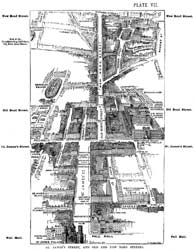






| Issue 5 : Hound, Chapters 5 and 6 | ||||||
Several different schools of Belgian painters were active in the late 19th century. James Ensor (1860-1949), arguably the most famous, was a maverick who painted on macabre themes and anticipated the symbols of Expressionism. Of the Symbolist painters, Fernand Khnopff (1858-1921) is probably the best known. Others painted in a naturalistic style, depicting workers and peasants at their labors. Watson occasionally mentions Holmes's ignorance of all things that do not touch on detective work: In later stories, Holmes no longer seems to be quite so ignorant, but actually has a good knowledge of many disciplines that do not touch upon criminal activities, especially music. ...and when he did speak it was in a much broader and more Western dialect than any which we had heard from him in the morning. Apparently, Sir Henry Baskerville's American accent grows stronger when he is upset. "Seems to me they are playing me for a sucker in this hotel," he cried. "They'll find they've started in to monkey with the wrong man unless they are careful. By thunder, if that chap can't find my missing boot there will be trouble. I can take a joke with the best, Mr. Holmes, but they've got a bit over the mark this time." Conan Doyle loved American "wild-west" adventure stories, and they might have been his major source of knowledge about American slang expressions. In this passage, he makes the most out of Sir Henry's use of American slang, mixing it with Briticisms such as "chap" and "they've got a bit over the mark." Perhaps he was trying to show that Sir Henry's character had been formed by exposure to two cultures: his upbringing in Devon and his later experiences in North America. | ||||||
